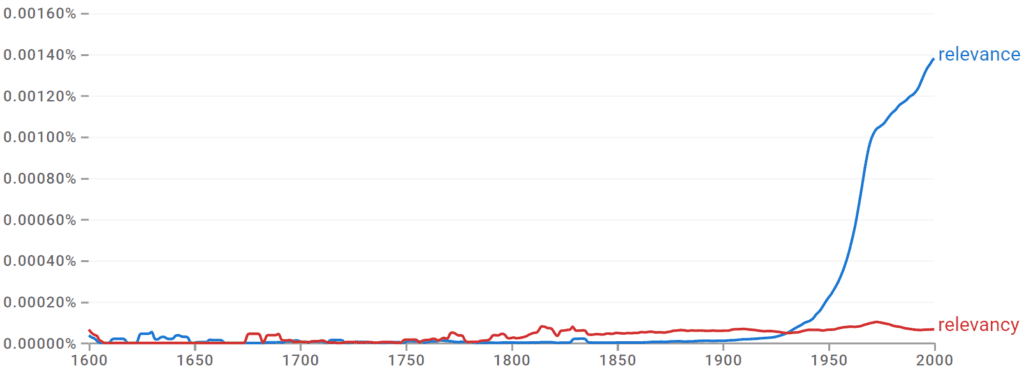Relevance or relevancy? Both words mean the same thing, but many people think relevancy isn’t a word despite it being the original form.
These words, which derive from the root word relevant, mean to connect to what is being done or considered. They serve as a noun to highlight the degree of this relationship and have been around since at least the mid-16th century.
Let’s take a closer look at their use and why one is more accepted in modern use than the other.
Relevance vs. Relevancy: What’s the Difference?

Relevance is defined as the degree to which something is considered useful or related to something else. It is the quality of the connection between two or more people or things.
For example:
- She did not understand the directions’ relevance to the project and asked to see an example.
- The research presented highlighted the relevance of the data and how it could be used to advance the next stages of the study.
- Their teacher was easily distracted and often spoke on subjects that had no relevance to the classroom topics.
There is no difference between relevance and relevancy. Though the latter is the older form, relevance is now preferred in all varieties of English.

Relevance Definition and Use
Relevance is defined as the relation to a matter at hand or the pertinence or practical applicability of an action.
For example:
- Make sure to check if there is even any relevance between what she told you and your end results; if not, you may need to rework the problem.
Relevance Etymology
Relevance is a combination of the root word relevant from the 1550’s French “depending upon” and the suffix – ance, which means to donate quality, state, or action. Its recognizable use was not seen until the early to mid-1700s.
Relevancy Definition and Etymology
Relevancy means the same as relevance but is a combination of relevant and -ancy. It was used much earlier in speech and writing — seen in the 1550s.
For example:
- My lawyer questioned the relevancy of the questions asked by the District Attorney, condemning them as leading the witness.
Let’s Review
There is no difference between the words relevant and relevancy. They both are nouns to mean the quality of relating one thing to another. Relevancy is the older word, coming into use in the mid-16th century, while relevant made a stronger appearance in the 1800s and is now the preferred term in all English-speaking countries.
